Amazingnotes
On this page, you find all documents, package deals, and flashcards offered by seller AMAZINGNOTES.
- 574
- 0
- 15
Community
- Followers
- Following
10 Reviews received
589 items
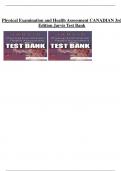
Complete Test Bank Physical Examination and Health Assessment CANADIAN 3rd Edition Jarvis Questions & Answers with rationales (Chapter 1-31),
Chapter 01: Evidence-Based Assessment MULTIPLE CHOICE 1. After completing an initial assessment of a patient, the nurse has charted that his respirations are eupneic and his pulse is 58 beats per minute. These types of data would be: a. Objective. b. Reflective. c. Subjective. d. Introspective. ANS: A Objective data are what the health professional observes by inspecting, percussing, palpating, and auscultating during the physical examination. Subjective data is what the person says ab...
- Book
- Exam (elaborations)
- • 478 pages •
Chapter 01: Evidence-Based Assessment MULTIPLE CHOICE 1. After completing an initial assessment of a patient, the nurse has charted that his respirations are eupneic and his pulse is 58 beats per minute. These types of data would be: a. Objective. b. Reflective. c. Subjective. d. Introspective. ANS: A Objective data are what the health professional observes by inspecting, percussing, palpating, and auscultating during the physical examination. Subjective data is what the person says ab...
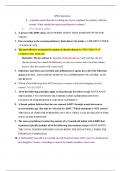
NR 603 Week 4 APEA Predictor Exam Review Questions & Answers
APEA Questions 1. A patient report that she is taking kava kava regularly for anxiety with the results. What should the nurse practitioners evaluate? a. Liver function studies 2. A person with 20/80 vision: HAS POORER VISION THAN SOMEONE WITH 20/40 VISION 3. One exception to the recommendation to limit dietary fat intake is CHILDREN UNDER 2 YEARS OF AGE 4. The most effective treatment for anemia of chronic disease is: TREATMENT OF UNDERLYING DISEASE Rationale: The key phrase is “anem...
- Exam (elaborations)
- • 70 pages •
APEA Questions 1. A patient report that she is taking kava kava regularly for anxiety with the results. What should the nurse practitioners evaluate? a. Liver function studies 2. A person with 20/80 vision: HAS POORER VISION THAN SOMEONE WITH 20/40 VISION 3. One exception to the recommendation to limit dietary fat intake is CHILDREN UNDER 2 YEARS OF AGE 4. The most effective treatment for anemia of chronic disease is: TREATMENT OF UNDERLYING DISEASE Rationale: The key phrase is “anem...
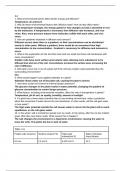
1.2.8 Lab_ Osmosis, Diffusion, and the Effects on Transpiration
1.1 1. What environmental factors affect kinetic energy and diffusion? Temperature, air pressure 2. Why do these environmental factors alter diffusion rates? How do they affect rates? If the temperature changes, the energy gained or lost changes as heat is absorbed or lost by the molecules. If temperature is increased, then diffusion rate increases, and vice versa. Also, more pressure means more molecules collide with each other, and vice versa. 3. How are gradients important in diffusio...
- Exam (elaborations)
- • 10 pages •
1.1 1. What environmental factors affect kinetic energy and diffusion? Temperature, air pressure 2. Why do these environmental factors alter diffusion rates? How do they affect rates? If the temperature changes, the energy gained or lost changes as heat is absorbed or lost by the molecules. If temperature is increased, then diffusion rate increases, and vice versa. Also, more pressure means more molecules collide with each other, and vice versa. 3. How are gradients important in diffusio...
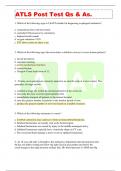
ATLS Post Test Qs & As. 2023
1. Which of the following signs is LEAST reliable for diagnosing esophageal intubation? a. symmetrical chest wall movement b. end-tidal CO2 presence by colorimetry c. bilateral breath sounds d. oxygen saturation >92% e. ETT above carina on chest x-ray 2. Which of the following signs the necessitates a definitive airway in severe trauma patients? a. fascial lacerations b. repeated vomiting d. sternal fracture e. Glasgow Coma Scale score of 12 3. Twenty-seven patients are seriously i...
- Exam (elaborations)
- • 11 pages •
1. Which of the following signs is LEAST reliable for diagnosing esophageal intubation? a. symmetrical chest wall movement b. end-tidal CO2 presence by colorimetry c. bilateral breath sounds d. oxygen saturation >92% e. ETT above carina on chest x-ray 2. Which of the following signs the necessitates a definitive airway in severe trauma patients? a. fascial lacerations b. repeated vomiting d. sternal fracture e. Glasgow Coma Scale score of 12 3. Twenty-seven patients are seriously i...
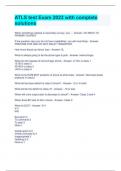
ATLS test Exam 2023 with complete solutions
When something crashes in secondary survey, you... - Answer- GO BACK TO PRIAMRY SURVEY If the question says you do not have capabilities, you will most likely - AnswerPREPARE FOR AND DO NOT DELAY TRANSPORT How much blood can femur lose - Answer- 2L What is always going to be the shock type to pick - Answer- Hemorrhagic What are the classes of hemorrhagic shock - Answer- 0-15% is class 1 15-30 is class 2 30-40% is class 3 >40% is class 4 What is the EARLIEST predictor of shock at what...
- Exam (elaborations)
- • 4 pages •
When something crashes in secondary survey, you... - Answer- GO BACK TO PRIAMRY SURVEY If the question says you do not have capabilities, you will most likely - AnswerPREPARE FOR AND DO NOT DELAY TRANSPORT How much blood can femur lose - Answer- 2L What is always going to be the shock type to pick - Answer- Hemorrhagic What are the classes of hemorrhagic shock - Answer- 0-15% is class 1 15-30 is class 2 30-40% is class 3 >40% is class 4 What is the EARLIEST predictor of shock at what...
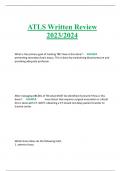
ATLS Written Review 2023/2024
What is the primary goal of treating TBI? How is this done? - ANSWER preventing secondary brain injury. This is done by maintaining blood pressure and providing adequate profusion. After managing ABCDEs of TBI what MUST be identified if present? How is this done? - ANSWER mass lesion that requires surgical evacuation is critical! this is done with CT. NOTE: obtaining a CT should not delay patient transfer to trauma center. Which brain lobes do the following hold: 1. anterior fossa:2. mid...
- Exam (elaborations)
- • 45 pages •
What is the primary goal of treating TBI? How is this done? - ANSWER preventing secondary brain injury. This is done by maintaining blood pressure and providing adequate profusion. After managing ABCDEs of TBI what MUST be identified if present? How is this done? - ANSWER mass lesion that requires surgical evacuation is critical! this is done with CT. NOTE: obtaining a CT should not delay patient transfer to trauma center. Which brain lobes do the following hold: 1. anterior fossa:2. mid...
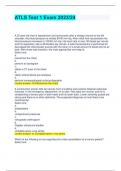
ATLS Test 1 Exam 2023/24
A 22-year-old man is hypotensive and tachycardic after a shotgun wound to the left shoulder. His blood pressure is initially 80/40 mm Hg. After initial fluid resuscitation his blood pressure increases to 122/84 mm Hg. His heart rate is now 100 beats per minute and his respiratory rate is 28 breaths per minute. A tube thoracostomy is performed for decreased left chest breath sounds with the return of a small amount of blood and no air leak. After chest tube insertion, the most appropriate ne...
- Exam (elaborations)
- • 16 pages •
A 22-year-old man is hypotensive and tachycardic after a shotgun wound to the left shoulder. His blood pressure is initially 80/40 mm Hg. After initial fluid resuscitation his blood pressure increases to 122/84 mm Hg. His heart rate is now 100 beats per minute and his respiratory rate is 28 breaths per minute. A tube thoracostomy is performed for decreased left chest breath sounds with the return of a small amount of blood and no air leak. After chest tube insertion, the most appropriate ne...
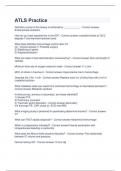
ATLS Practice 2023
Definitive control of the airway is achieved by ____________ - Correct answerEndotracheal intubation How do you treat hypothermia in the ED? - Correct answer-crystalloid fluids at 102.2 degrees F and warmed treatment area What does definitive hemorrhage control refer to? (3) - Correct answer-1) Possible surgery 2) Stabilizing of pelvis 3) Angioembolization What are rates of fluid administration measured by? - Correct answer-Size and length of catheter Minimum flow rate of oxygen reservo...
- Exam (elaborations)
- • 9 pages •
Definitive control of the airway is achieved by ____________ - Correct answerEndotracheal intubation How do you treat hypothermia in the ED? - Correct answer-crystalloid fluids at 102.2 degrees F and warmed treatment area What does definitive hemorrhage control refer to? (3) - Correct answer-1) Possible surgery 2) Stabilizing of pelvis 3) Angioembolization What are rates of fluid administration measured by? - Correct answer-Size and length of catheter Minimum flow rate of oxygen reservo...
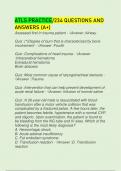
ATLS PRACTICE/234 QUESTIONS AND ANSWERS (A+)
Assessed first in trauma patient - √Answer :Airway Quiz :(*)Degree of burn that is characterized by bone involvement - √Answer :Fourth Quiz :Complications of head trauma - √Answer :Intracerebral hematoma Extradural hematoma Brain abscess Quiz :Most common cause of laryngotracheal stenosis - √Answer :Trauma Quiz :Intervention that can help prevent development of acute renal failure - √Answer :Infusion of normal saline Quiz :A 26-year-old male is resuscitated with blood trans...
- Exam (elaborations)
- • 52 pages •
Assessed first in trauma patient - √Answer :Airway Quiz :(*)Degree of burn that is characterized by bone involvement - √Answer :Fourth Quiz :Complications of head trauma - √Answer :Intracerebral hematoma Extradural hematoma Brain abscess Quiz :Most common cause of laryngotracheal stenosis - √Answer :Trauma Quiz :Intervention that can help prevent development of acute renal failure - √Answer :Infusion of normal saline Quiz :A 26-year-old male is resuscitated with blood trans...
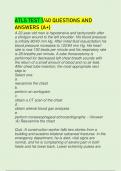
ATLS TEST 1/40 QUESTIONS AND ANSWERS (A+)
A 22-year-old man is hypotensive and tachycardic after a shotgun wound to the left shoulder. His blood pressure is initially 80/40 mm Hg. After initial fluid resuscitation his blood pressure increases to 122/84 mm Hg. His heart rate is now 100 beats per minute and his respiratory rate is 28 breaths per minute. A tube thoracostomy is performed for decreased left chest breath sounds with the return of a small amount of blood and no air leak. After chest tube insertion, the most appropriate...
- Exam (elaborations)
- • 25 pages •
A 22-year-old man is hypotensive and tachycardic after a shotgun wound to the left shoulder. His blood pressure is initially 80/40 mm Hg. After initial fluid resuscitation his blood pressure increases to 122/84 mm Hg. His heart rate is now 100 beats per minute and his respiratory rate is 28 breaths per minute. A tube thoracostomy is performed for decreased left chest breath sounds with the return of a small amount of blood and no air leak. After chest tube insertion, the most appropriate...

Edexcel a level history question paper optio n 2c 1 2 june 2023+ mark scheme
Edexcel a level history question paper optio n 1h britain transformed 1918 97 june 2023 + mark scheme
Edexcel gcse math s higher paper 1 june 2023 + mark scheme
Edexcel a level history question paper optio n 2c 1 2 june 2023+ mark scheme
Edexcel gcse english language paper 1 june 2023 + mark scheme